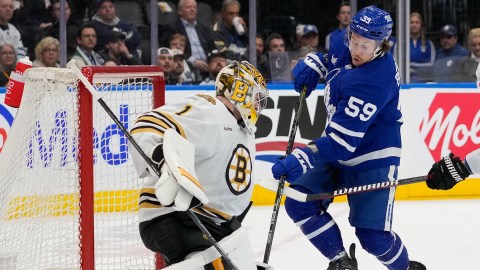Brain injuries are a real threat, but they can be prevented.
NESN is proud to host Children's Hospital Boston's Brain Injury Center Night on March 8 in honor of the many doctors and nurses who help with these injuries.
Many brain injuries are sports-related and the NHL has started to taken serious actions to prevent these injuries from recurring through suspensions and other league-wide rules.
Below are a list of facts about brain injuries and the ThinkFirst program assocaited with Children's Hospital Boston:
- 500,000 persons sustain a brain or spinal cord injury each year.
- Brain injury is the leading cause of death for children and teens.
- These injuries are preventable.
- An estimated 173,285,000 visits to the emergency room each year are sports and recreation related traumatic brain injuries of children younger than 19. The majority of these injuries are concussions.
- A concussion is a type of traumatic brain injury described as a "mild" brain injury because concussions are not usually life-threatening.
- A concussion can be serious, especially if the brain is not given adequate time to heal before returning to sports or activities.
- Preventing concussions, recognizing symptoms, seeking medical evaluation and following concussion guidelines are all important for full recovery and the prevention of more serious effects.
- Athletes who have had a concussions are at risk for another concussion.
- Children's Hospital Boston's Brain Injury Center evaluates and treats over 250 children each month for sport and non-sport related concussion.
- We recognize that children and teens are more likely to get a concussion and take longer to recover than adults.
- Children's Hospital Boston's Brain Injury Center specializes in the management and treatment of all types of traumatic brain injury.
- Contact number 617-355-2490
- Children's Hospital Boston provides a multidisciplinary approach to meet the needs of our pediatric patients.
- Our team includes physicians, neuropsychologist, psychologists, nurse practitioners and nurses all who specialize in the care of the patient with a brain injury.
- The center coordinates care across several services — including the Trauma Center, Neurology, Neurosurgery, Sports Medicine and Neuropsychology — to enhance the health and well-being of patients, minimize distress and prevent longer-term difficulties. Access to acute and follow-up care is an essential component of this multidisciplinary center.
- Our program cares for patients admitted to the hospital with a TBI. We also care for patients in our Sports Concussion Clinic, Neurology Clinic, and Brain Injury Clinic.
- ThinkFirst Injury Prevention Program are available free of charge to schools and community organizations. Please call 617-355-2281 if you are interested in this program.
- ThinkFirst provides educational programs focused on the prevention of brain and spinal cord injuries.
- In addition to ThinkFirst the Brain Injury Center staff provide education on concussion to schools and community agencies as well as participating in many school and community injury prevention groups.
- Children's Hospital researchers have recently assisted in the development of the new Massachusetts law requiring a Head Injury Safety Training program for high school interscholastic sports.
- Governor Deval Patrick signed a law in July 2010 aimed at increasing concussion awareness and requiring an interscholastic athletic Head Injury Safety Training program to help reduce the potentially catastrophic impact of sport related concussions.
- The Head Injury Safety Training Program requires all coaches, athletes, and other participants, including the parents or legal guardians of players, to complete a course that highlights the signs and symptoms of concussion and provides treatment recommendations.
- The law states that students participating in an athletic activity who become unconscious during a practice or competition shall not return to play until been cleared by a healthcare professional.
- The law also requires that high school athletes who incur head injuries, or are suspected to have sustained a concussion, even when there is no loss of consciousness, sit out until they receive medical clearance to return (i.e. "return to play").



